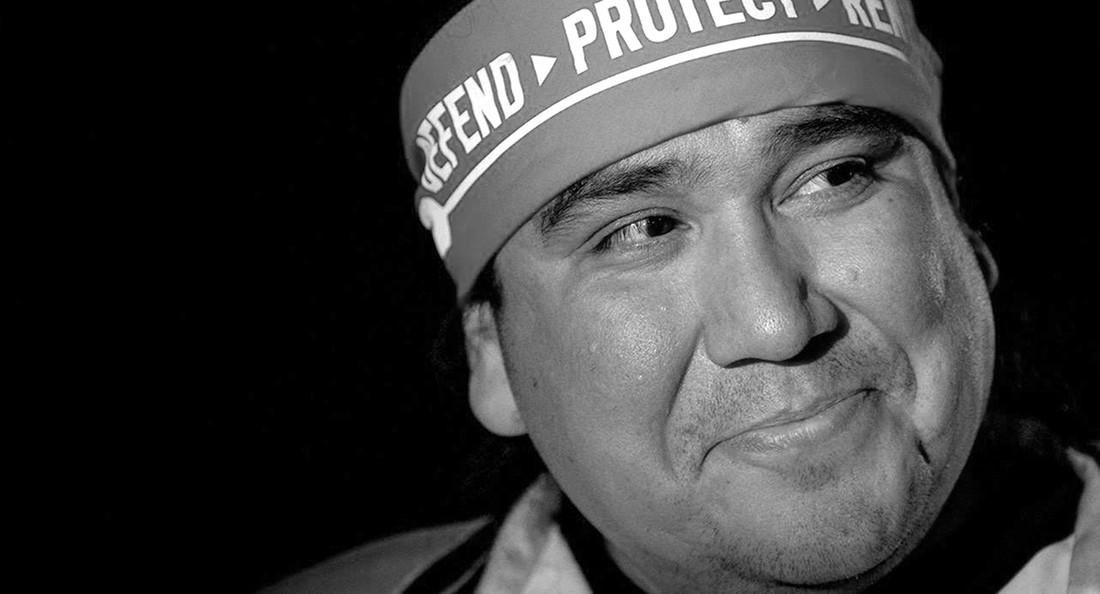Life in the City of Dirty Water
A conversation with Clayton Thomas-Müller
Clayton Thomas-Müller is delivering his transmedia presentation, Life in the City of Dirty Water at the West End Cultural Centre on Jan. 30.
Born and raised in Winnipeg, Thomas-Müller is a public speaker and writer on environmental and economic justice. He has been published in several books and media outlets and has appeared on national television and radio as an advocate for Indigenous rights.
Thomas-Müller’s activism has centered around the intersections of Indigenous rights, climate change and supporting First Nations communities who are fighting against the encroachment of big oil in their backyards.
In Thomas-Müller’s transmedia project, Life in the City of Dirty Water, the focus is turned toward his experiences growing up as an urbanized Indigenous youth in the 1990s.
Thomas-Müller’s experience with being exposed to gang culture as a teen serves as source material.
“I started with writing about some of the challenges I faced growing up in the inner-city, such as working for the Manitoba Warriors as a teenager alongside my brothers, and how growing up in poverty affected my family and I,” Thomas-Müller says.
He feels that the circumstances that he found himself in as a teen are a common story for children of parents who survived residential schools.
In 2014, the Canadian Museum of Human Rights (CMHR) profiled Thomas-Müller for a series on human rights activists.
The CMHR interviewed him to create the profile, further transcribing it for him for his own use. Out of this process came the first manuscript for Life in the City of Dirty Water.
“That manuscript was way too fucked up to publish. It was a lot,” Thomas-Müller says with a laugh.
He feels that a cultural revolution happening in Winnipeg and across North America in Indigenous communities, and that what’s missing from the conversation Indigenous men are having is discourse about dismantling patriarchy and all its manifestations in Indigenous communities.
“It’s a story about growing up Native in the city and overcoming systemic, interpersonal and internalized racism,” Thomas-Müller says. “It’s a very real take on issues that are very common with Indigenous men. A lot of the project is about confronting patriarchy and meaningfully addressing toxic masculinity.”
In the telling of Life in the City of Dirty Water, he uses audio and video, as well as live readings of his book of the same name.
“My hope is that people will hear someone like myself sharing what it took to get to where I am and feel empowered to do the same. We need to normalize these difficult conversations we need to be having in the Native community and in society at large.”
In his experience with creating digital media as part of campaigning for Idle No More, Thomas-Müller realized that people learn in different ways. By creating a presentation that uses several different mediums to tell a story, he feels that he has a greater chance of the subject matter having an impact on his audience.
“I’ve embraced all digital platforms as conduits to share the issues at hand to the masses, to help shift popular opinion. We’ve had to get wise to how to utilize these platforms to tell our stories.”
During Thomas-Müller’s time campaigning for Idle No More, he worked with videographer Spencer Mann, who later became the director and videographer for the film component of Life in the City of Dirty Water.
Mann flew across North America to document Thomas-Müller’s storytelling in the spirit of oral history and polymorphic language at various mobilizations and direct actions. Over the course of 25 days, the duo created a series of video retellings of Thomas-Müller’s book.
“We created video vignettes of the themes of decolonization and healing, confronting trauma and residential school syndrome. The goal was to create a transmedia project that could be considered a survival guide for Indigenous people who have been urbanized and dispossessed as a result of colonialism,” Thomas-Müller says.
He returned to Winnipeg in 2015, concluding 15 years spent living between Ottawa and Vancouver.
This homecoming meant being able to reconnect with his community and family. Thomas-Müller also wanted his children to have the opportunity to connect with their culture and language.
“Returning to Winnipeg forced me to face what I’ve been running from my entire adult life. It also meant being closer to the people I go to ceremony with and taking my evolution as an activist and father to the next level.”
“After burning myself out many times over as an activist and campaigner, just fighting my way through doing that work, I realized that my kids were growing up fast, and that living in Ottawa without any of mine or my wife’s family around to support us wasn’t really a sustainable situation,” Thomas-Müller says. “It was a practical choice and very much about coming home to get the supports we need to be successful in raising our kids.”
The support of Thomas-Müller’s family and community were integral to the creation of Life in the City of Dirty Water.
“It took me many years to learn it, but you can’t really do incredible things in your life without a solid support network, whether that be family or community,” Thomas-Müller says. “Overcoming obstacles and trauma is almost impossible without that support.”
Life in the City of Dirty Water: A Conversation with Clayton Thomas-Müller is being held on Jan. 30 at the West End Cultural Centre. Doors are at 7:15 p.m., and the event begins at 8 p.m. This event is free and open to all.
Published in Volume 72, Number 15 of The Uniter (January 25, 2018)








